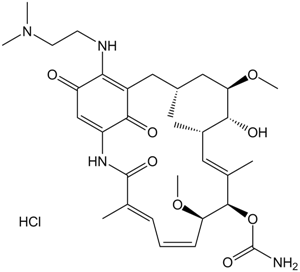17-DMAG (Alvespimycin) HCl |
| Catalog No.GC13044 |
17-DMAG (Alvespimycin) HCl (17-DMAG hydrochloride; KOS-1022; BMS 826476) is a potent inhibitor of Hsp90, binding to Hsp90 with EC50 of 62±29 nM.
Products are for research use only. Not for human use. We do not sell to patients.

Cas No.: 467214-21-7
Sample solution is provided at 25 µL, 10mM.
17-DMAG is an inhibitor of Hsp90 with IC50 value of 62±29nM [1].
17-DMAG can bind to the ATP-binding motif of Hsp90 and inhibit the protein chaperoning activity of Hsp90. It will cause misfolding and subsequent degradation of Hsp90’s client proteins, such as EGFR, AKT, mutant p53, and IKK. Since there is more specific conformation Hsp90 required for 17-DMAG binding in tumor cells and many client proteins of Hsp90 contribute to tumor cell growth, 17-DMAG is usually more toxic to tumor cells than to normal cells [2].
17-DMAG is reported as an antitumor agent with more broadly exploitable activity and more pharmaceutically tractable characteristics in the in vitro and initial in vivo assay. 17-DMAG can effect cell growth when treating the NCI 60 cell lines with it, the mean GI50 is 0.053mM. The in vivo activity of 17-DMAG is tested in four melanoma models using the Freiburg human tumor xenograft panel and two lung xenografts. It shows that 17-DMAG has high activity in the two lung xenografts and two of the four melanoma models, but not in another two, MEXF 462 and MEXF 514 [3].
Reference:
[1] Jie Ge, Emmanuel Normant, James R. Porter, Janid A. Ali, Marlene S. Dembski, Yun Gao, Asimina T. Georges, Louis Grenier, Roger H. Pak, Jon Patterson, Jens R. Sydor, Thomas T. Tibbitts, Jeffrey K. Tong, Julian Adams, and Vito J. Palombella. Design, synthesis and biological evaluation of Hydroquinone derivatives of 17-Amino-17-demethoxygeldanamycin as potent, water-soluble inhibitors of Hsp90. J. Med. Chem. 2006, 49, 4606-4615.
[2] Xiaoping Sun, Jillian A. Bristol, Satoko Iwahori, Stacy R. Hagemeier, Qiao Meng, Elizabeth A. Barlow, Joyce D. Fingeroth, Vera L. Tarakanova, Robert F. Kalejta, Shannon C. Kenney. Hsp90 Inhibitor 17-DMAG Decreases Expression of Conserved Herpesvirus Protein Kinases and Reduces Virus Production in
Epstein-Barr Virus-Infected Cells. Journal of Virology. 2013, 87 (18): 10126–10138.
[3] Melinda Hollingshead, Michael Alley, Angelika M. Burger, Suzanne Borgel,
Christine Pacula-Cox, Heinz-Herbert Fiebig, Edward A. Sausville. In vivo antitumor efficacy of 17-DMAG (17-dimethylaminoethylamino-17-demethoxygeldanamycin hydrochloride), a water-soluble geldanamycin derivative. Cancer Chemother Pharmacol. 2005, 56: 115–125.
Average Rating: 5 (Based on Reviews and 7 reference(s) in Google Scholar.)
GLPBIO products are for RESEARCH USE ONLY. Please make sure your review or question is research based.
Required fields are marked with *




















